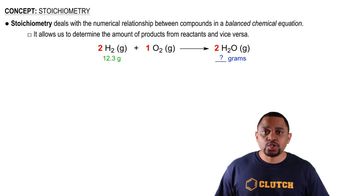Consider the reaction: H2(g) + I2(g) ⇌ 2 HI(g) A reaction mixture at equilibrium at 175 K contains PH2 = 0.958 atm, PI2 = 0.877 atm, and PHI = 0.020 atm. A second reaction mixture, also at 175 K, contains PH2 = PI2 = 0.621 atm and PHI = 0.101 atm. Is the second reaction at equilibrium? If not, what will be the partial pressure of HI when the reaction reaches equilibrium at 175 K?
Ch.16 - Chemical Equilibrium
Chapter 16, Problem 88
The equilibrium constant for the reaction SO2(g) + NO2(g) ⇌ SO3(g) + NO(g) is Kc = 3.0. Find the amount of NO2 that must be added to 2.4 mol of SO2 in order to form 1.2 mol of SO3 at equilibrium.

Verified Solution
Video duration:
2mWas this helpful?
Key Concepts
Here are the essential concepts you must grasp in order to answer the question correctly.
Chemical Equilibrium
Chemical equilibrium occurs when the rates of the forward and reverse reactions are equal, resulting in constant concentrations of reactants and products. The equilibrium constant (Kc) quantifies this balance, indicating the ratio of product concentrations to reactant concentrations at equilibrium. Understanding this concept is crucial for predicting how changes in concentration affect the system.
Recommended video:
Guided course

Chemical Equilibrium Concepts
Equilibrium Constant (Kc)
The equilibrium constant (Kc) is a numerical value that expresses the ratio of the concentrations of products to reactants at equilibrium, each raised to the power of their coefficients in the balanced equation. For the reaction SO2(g) + NO2(g) ⇌ SO3(g) + NO(g), Kc = 3.0 means that at equilibrium, the concentration of SO3 and NO is three times that of SO2 and NO2. This constant helps in calculating the necessary concentrations to achieve equilibrium.
Recommended video:
Guided course

Equilibrium Constant Expressions
Stoichiometry
Stoichiometry involves the calculation of reactants and products in chemical reactions based on the balanced equation. It allows us to determine the amounts of substances consumed and produced. In this question, stoichiometry is essential for calculating how much NO2 must be added to achieve the desired amount of SO3 at equilibrium, using the initial amounts and the equilibrium constant.
Recommended video:
Guided course

Stoichiometry Concept
Related Practice
Textbook Question
2876
views
Textbook Question
A reaction vessel at 27 °C contains a mixture of SO2 (P = 3.00 atm) and O2 (P = 1.00 atm). When a catalyst is added, this reaction takes place: 2 SO2( g) + O2( g) ⇌ 2 SO3( g). At equilibrium, the total pressure is 3.75 atm. Find the value of Kc.
3381
views
Textbook Question
At 70 K, CCl4 decomposes to carbon and chlorine. The Kp for the decomposition is 0.76. Find the starting pressure of CCl4 at this temperature that will produce a total pressure of 1.0 atm at equilibrium.
1646
views
Textbook Question
Carbon monoxide and chlorine gas react to form phosgene: CO(g) + Cl2(g) ⇌ COCl2(g) Kp = 3.10 at 700 K If a reaction mixture initially contains 215 torr of CO and 245 torr of Cl2, what is the mole fraction of COCl2 when equilibrium is reached?
3946
views
